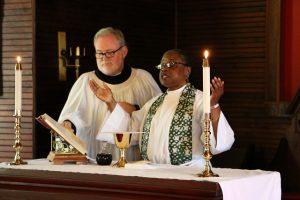Lectionary Reflection for the Ninth Sunday after Pentecost, Year C
July 17, 2016
O Lord, who may abide in your tent? Who may dwell on your holy hill? Psalm 15:1
Inquiring minds want to know: Who is part of the “in crowd”? Who is going to “make it”? What does it take to be “saved”? What does it take to win “church-goer of the year” award, or earn super-parent status, or a hipster cool designation? Seriously? That sounds ludicrous when you really think about it. Yet in fact, some folks do spend a lot of time fretting over these questions, fretting in a way that is not productive and that misses the entire point of what discipleship and life are all about. Perhaps it’s part of our human nature. Maybe it has more to do with our acculturation to being people of action and self-reliance. We are indeed “busy bees” who rush from place to place and task to task day in and day out, seeking fulfillment, meaning, and purpose in all the wrong places.
Funny how at the end of the day and week, folks are often just plain too tired to abide in God’s house. Busy professionals feel pressured to perform well and work longer hours. Families with young children and teens balance multiple activities and overstuffed schedules. Retirees often  find themselves busier than when they were working. Many people cobble together two and three jobs to make ends meet. Who may dwell on your holy hill, God? The over-achievers? The chronically stressed? The emotionally drained? Those who manage the illusion of HGTV perfection? The parents trying to hold everything together with duct-tape and dreams? The elderly widow who is convinced by political pundits that the sky is falling? The couple whose marriage is shattering like broken glass all around them? The mother who sends her black son off to school every morning praying that he’ll come home in one piece at night? The cynical, depressed, regressed, or badly dressed? Yes. In a word yes.
find themselves busier than when they were working. Many people cobble together two and three jobs to make ends meet. Who may dwell on your holy hill, God? The over-achievers? The chronically stressed? The emotionally drained? Those who manage the illusion of HGTV perfection? The parents trying to hold everything together with duct-tape and dreams? The elderly widow who is convinced by political pundits that the sky is falling? The couple whose marriage is shattering like broken glass all around them? The mother who sends her black son off to school every morning praying that he’ll come home in one piece at night? The cynical, depressed, regressed, or badly dressed? Yes. In a word yes.
God’s holy hill has room for all, but the choice is ours to make. No one is going to drag us kicking and screaming like a toddler to sit there in misery. The Divine One is not inclined to upend our apple cart of good intentions that somehow has taken a wrong turn.
“Martha, Martha, you are worried and distracted by many things; there is need of only one thing,” says Jesus to the hostess-with-the-mostest who is irritated that her sister has chosen to abide in Christ’s presence, drinking in every precious moment and word with the master. Hospitality is her role, and she is determined to do it well—even if it means missing the Lord’s loving presence and wisdom right in front of her eyes.
Who may abide and who may dwell in God’s house? Yes, there is room for all people, but abiding and dwelling also mean letting go AND going against the grain, and my how difficult it is to do that!
Who may abide and dwell in God’s presence? The psalmist says “Those who walk blamelessly, and do what is right, and speak the truth from their heart; who do not slander with their tongue, and do no evil to their friends, nor take up a reproach against their neighbors; in whose eyes the wicked are despised, but who honor those who fear the Lord; who stand by their oath even to their hurt; who do not lend money at interest, and do not take a bribe against the innocent.” A tall order indeed! It’s an order that’s quite unachievable on one’s own.
 Like Martha’s culture-bending sister, Mary, we must choose the better part. We must choose to live in the moment, cast our hopes and fears and hurts on Jesus and trust him to guide us home to dwell in the house of God forever. In the meantime, it means coming to God’s house, living with God’s wonderful, beloved, and most imperfect people. It means choosing mercy and justice over culture’s many claims and false promises. It means opening our arms and hearts and homes to our neighbors and strangers, knowing that in doing so we may entertain angels unawares. Yes, we are called to extend hospitality, but we are also called to receive it from one another. In short then, it means laying it all down—our expectations, demands, requirements, prejudices, and fears to sit at Jesus’ feet, to abide with and in him.
Like Martha’s culture-bending sister, Mary, we must choose the better part. We must choose to live in the moment, cast our hopes and fears and hurts on Jesus and trust him to guide us home to dwell in the house of God forever. In the meantime, it means coming to God’s house, living with God’s wonderful, beloved, and most imperfect people. It means choosing mercy and justice over culture’s many claims and false promises. It means opening our arms and hearts and homes to our neighbors and strangers, knowing that in doing so we may entertain angels unawares. Yes, we are called to extend hospitality, but we are also called to receive it from one another. In short then, it means laying it all down—our expectations, demands, requirements, prejudices, and fears to sit at Jesus’ feet, to abide with and in him.
Who may abide with God? You, that’s who! Come and be fed. Come and be welcomed just as you are. Dwell with Christ who loves you beyond all measure. You have nothing to prove and EVERYTHING for which to live.
In Worship
Most congregations would describe themselves as “welcoming” congregations, although that my not be a guest’s experience of the people and facility. Consider having someone give a temple talk about being an “inviting” congregation, one that extends hospitality beyond the sanctuary walls. Here’s a wonderful reflection by Rob Moss about the difference between being “welcoming” and “inviting.” Consider using this week’s worship as a time to commit to a new approach to hospitality. Incorporate the hymn “Gather Us In” by Marty Haugen and challenge worshipers to invite others to be gathered in, too. Remind congregants that hospitality is not just about myriad programs, gorgeous websites and publications, and worship that rivals an arena production. It is more about being present in God’s house, being together, and siting at the feet of Christ to be nourished, fed, and equipped for mission and ministry outside the walls.
With Youth
“Cosmic Christ” is how scholars sometimes refer to the image of Jesus painted by the writer of Colossians. Read this week’s epistle lesson from Eugene Peterson’s The Message and discuss with youth what they hear, sense, and feel in this passage. How do these words ring true in our current culture? Consider this snippet: “So spacious is he, so roomy, that everything of God finds its proper place in him without crowding. Not only that, but all the broken and dislocated pieces of the universe—people and things, animals and atoms—get properly fixed and fit together in vibrant harmonies…” What does that say to us, and how do we participate in this gathering into Christ? What role does the writer say that “suffering” has? How can we take this very basic yet cosmic message into a hurting world?
With Children
To DO or To BE: This is the question. Invite children to tell you what they like to do around the house. Do they help clean? Do they wash dishes? Do they care for the pets? Accept and affirm the answers–even if a child says they don’t like to do anything at all. Talk about how Martha was a “busy bee” running around making her house lovely and preparing perfect food for Jesus. Mary, on the other hand, simply wanted to BE in Jesus’ presence and listen to him and spend time with him. Invite the children and their families to find time each day to BE in Jesus’ presence.
All it takes is five to 15 minutes to BE together and BE in Jesus’ presence through sharing highs and lows, reading a Bible verse or story, talking about the story or verse, praying together, and blessing one another. You can find resources here for Faith5 (Faith Acts in the Home) activities and practices. Consider incorporating this program into your congregational life.
Finish with a simple blessing of each child and a prayer that they not only DO what Jesus wants them to do but also that they will BE with Jesus each day. Invite the children to bless the adults in the congregation during the passing of the peace.
Photos: lululemon athletica, Ansel Edwards, and Episcopal Diocese of Southwest Florida, Creative Commons. Thanks!)




Leave a Reply